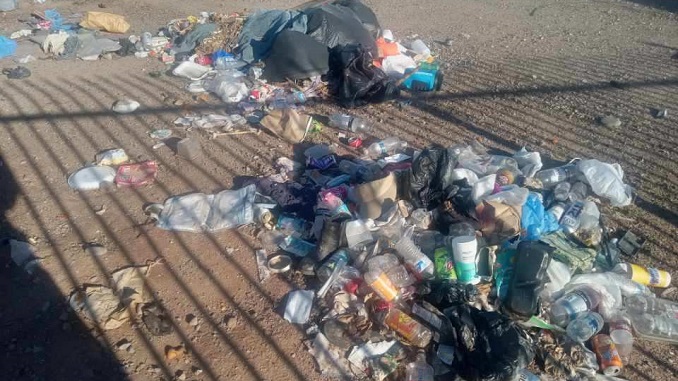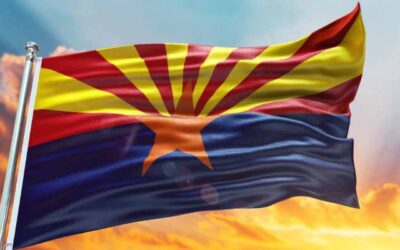By Matthew Holloway |
The Arizona Supreme Court recently declined to review an Appeals Court ruling holding the City of Tucson liable for a public nuisance caused by homeless encampments, siding with three property owners who suffered property damage and financial losses. The Goldwater Institute highlighted this case as “welcome news for all Arizonans,” following the adoption of voter-approved Proposition 312.
The case, Bradford v. City of Tucson, comes on the heels of a similar court ruling against the City of Phoenix over its “Zone” encampment and is now being highlighted by the Goldwater Institute alongside voter-approved Proposition 312—a 2024 measure that lets property owners seek refunds when cities decline to enforce basic public nuisance laws.
Filed on behalf of three Tucson residents, the lawsuit sought injunctive relief against the City of Tucson, after homeless encampments near their homes and businesses in the Navajo Wash developed with makeshift toilets, dangerous fires, and individuals engaging in violent and criminal behavior.
The appellate court, reversing a trial court ruling against the residents, found that the “record is replete with testimony of specific incidents which proved that camping in the Navajo Wash has caused unsanitary and indecent conditions that invade the rights of the neighboring residents and business owners,” and demonstrated that Tucson was not shielded from liability “because the City knew the activity of homeless camping in this location was being carried on and that it repeatedly and continually caused a nuisance, yet consented to it anyway.”
Prop 312 now gives property owners a reimbursement tool in situations like those described in Bradford v. Tucson, allowing Arizonans to seek relief when a municipality “follows a policy, pattern, or practice of declining to enforce existing nuisance laws prohibiting illegal camping, obstructing public thoroughfares, loitering, panhandling, public urination or defecation, public consumption of alcoholic beverages, or possession or use of illegal substances, or maintains a public nuisance,” according to the Goldwater Institute’s explanation of Prop 312 claims.
Reimbursements are capped at the amount of property taxes paid the prior year, with any excess eligible for reapplication later.
Goldwater explained the law’s necessity on its website:
“Rampant homelessness is overtaking Arizona’s cities, as municipalities refuse to enforce laws against public camping, loitering, intoxication, and other nuisances. The result has been a rise in violent crime, biohazardous pollution, property destruction, and even death. Residents and business owners have had to take matters into their own hands, installing fences, hiring security, and cleaning up garbage, human waste, and other hazardous materials themselves—services the city is supposed to provide with the tax money these residents pay every year.”
Under Prop 312, once the Department of Revenue notifies a municipality of a claim, the city has 30 days to accept or reject it. If rejected, property owners may challenge the decision in superior court; if the city does not respond in time, the refund is deemed approved. Goldwater has offered to assist residents, saying, “If you believe your claim was improperly denied and you would like legal assistance, please contact us! Our lawyers may be able to help you.”
Claims are filed through the Department of Revenue’s online portal at prop312reimbursement.aztaxes.gov, which requires proof of property ownership, tax payment, and mitigation costs. The department notifies cities and issues approved reimbursements by check.
The decision represents a major blow to a large Arizona city’s assertion of immunity and underscores growing frustration with Tucson’s approach to homelessness amid public safety concerns.
In an op-ed Monday, Timothy Sandefur, Goldwater’s vice president for legal affairs, urged city leaders to act:
“Homelessness is a tragic and frustrating issue. But policies that leave people living on the streets aren’t the answer. Instead, they only create a new set of victims: the innocent taxpayers who must pay for police protection that they don’t receive. The time has come for city officials to shoulder their responsibilities—instead of forcing homeowners to shoulder the costs.”
Sandefur also warned that property owners in other states lack similar protections, citing Utah, and encouraged lawmakers elsewhere to “follow Arizona’s lead” by adopting Goldwater’s proposed Safe Neighborhoods Act.
Correction Notice: A previous version of this story incorrectly linked the Bradford v. Tucson case to the Goldwater Institute and cited an unrelated ruling.
Matthew Holloway is a senior reporter for AZ Free News. Follow him on X for his latest stories, or email tips to Matthew@azfreenews.com.








